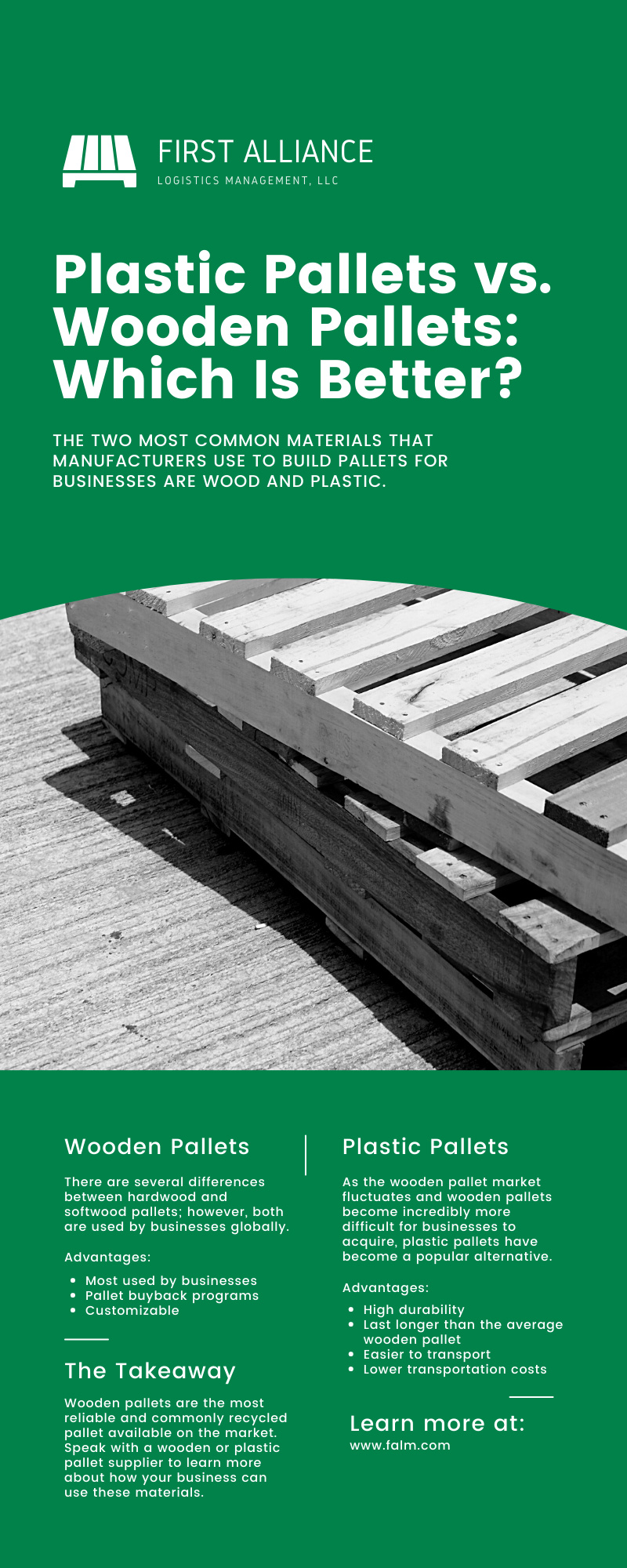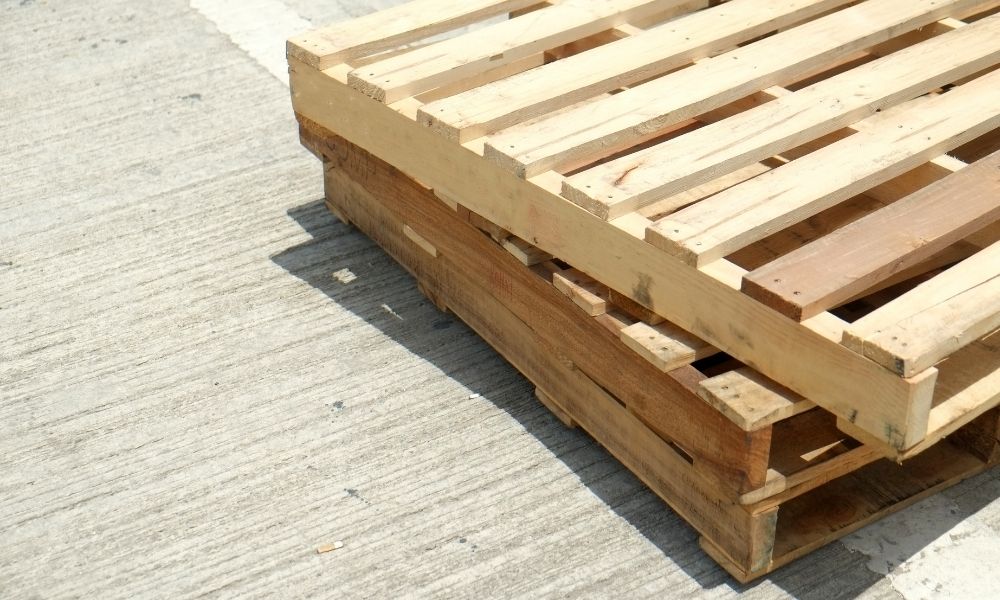- By First Alliance Logistics Management
- October 20, 2021
- Buying Pallets
As different factors such as price, demand, and sustainability fluctuate within the pallet market, pallet users are consistently asking how they can use the most cost-effective and reliable materials. The two most common materials that manufacturers use to build pallets for businesses are wood and plastic.
While wooden pallets have long been the standard material used by different businesses and industries, the use of plastic pallets has increased significantly. So, what’s the difference between plastic and wooden pallets? How does using either of these materials affect businesses? What industries use these pallets the most?
We’re here to answer all these questions. In this article, we’re sharing our guide to understanding plastic versus wooden pallets and examining which one is better for different businesses and industries. Continue reading our article below to learn more.
Wooden Pallets
To begin, we’ll dive deep into the advantages of using wood materials for pallets. Since wood was the first material manufacturers used, this pallet type has had a long history of successfully storing and safely transporting merchandise for businesses.
Types of Wooden Pallets
However, not all wood pallets are the same. Apart from size and dimensions, the type of wood used for a pallet can also differ significantly. The three most common types of pallets that manufacturers build from different woods are as follows:
- Hardwood pallets
- Softwood pallets
- Mixed hardwood and softwood pallets
There are several differences between hardwood and softwood pallets; however, both are used by businesses globally. Pallets built with a mixture of hardwood and softwood materials are most likely recycled pallets bought through a buyback program. Buyback programs are a form of cost-effective recycling for wooden pallet users. These programs are also a major advantage for wooden pallets users.
Recycling Wooden Pallets
Once a business uses a wooden pallet, owners can resell these materials for a rebate through buyback programs. Pallet recycling programs use a grading system to assess the wear and damage of used pallets and determine a fair resell price. Businesses can also buy used pallets at a lower price.
Wooden pallet recycling programs come with several different advantages. First, businesses benefit from making a profit from their used pallets. Second, recycling used pallets prevents companies from having to pay to have their used materials moved. And, lastly, recycling these materials benefits the environment and decreases the carbon footprint of different businesses.
Since plastic pallets cannot be repaired or reused after sustaining damage, plastic pallets do not share this significant advantage.
Wooden Pallet Customizations
Another difference between wooden and plastic pallets is flexibility and customizations. When businesses need custom pallets for their merchandise, manufacturers can rebuild and restore wooden pallets to the exact custom dimension that a business needs. However, plastic pallets are the same.
Since plastic pallets cannot be broken down and rebuild with specific size and design customizations, they are not ideal for businesses that require customizations.
Wooden Pallet Pricing
When comparing the price of plastic and wooden pallets, this figure can often fluctuate due to changes in the market. Therefore, while plastic pallets can often be more expensive, wooden pallet prices can also rise and become more inaccessible.
Wooden Pallet Advantages
- Most used by businesses
- Pallet buyback programs
- Customizable
Plastic Pallets
As the wooden pallet market fluctuates and wooden pallets become incredibly more difficult for businesses to acquire, plastic pallets have become a popular alternative. Continue reading to learn the advantages and disadvantages of using plastic pallets.
Durability
One of the best advantages that plastic pallets offer is their more robust durability. Of course, the handling of plastic pallets can affect their overall stability. However, compared to wooden pallets, plastic pallets can often hold heavier loads and go longer without being damaged. Businesses can save money when they use plastic pallets because these storage containers last so long.
Easier Transportation
Whenever moving pallets inside a warehouse, the overall weight of a pallet’s lumber must be accounted for. According to My Pallet Market, 30 to 35 percent of a shipment’s overall weight is from the weight of a wooden pallet’s lumber. Plastic pallets will reduce the overall weight of your shipment significantly.
Recycling Plastic Pallets
When it comes to debating wooden versus plastic pallets and which one is better at increasing a business’s sustainability, there are several different factors to consider. First, plastic pallets are 100 percent recyclable. Second, since these pallets can be reused and last longer than the average pallet, they can help to reduce waste.
However, pallet users cannot repair plastic pallets once they are damaged. Unlike wooden pallets, pallet manufacturers cannot restore parts and pieces to build a newly recycled plastic pallet. Since manufacturers cannot restore plastic pallets, businesses cannot take advantage of the same revenue streams that the recycled wooden pallets buyback program offer.
Plastic Pallet Advantages
- High durability
- Last longer than the average wooden pallet
- Easier to transport
- Lower transportation costs
The Takeaway
We hope our guide on plastic versus wood pallets has been beneficial for you to determine which one is better for your business’s inventory and transportation needs. Different industries will benefit more from the use of plastic pallets instead of wooden pallets.
However, wooden pallets are the most reliable and commonly recycled pallet available on the market. Speak with a wooden or plastic pallet supplier to learn more about how your business can use these materials.
How FALM Can Help
Need help navigating between plastic or wooden pallets? If so, we’ve got you covered. Here at First Alliance Logistics Management, we’re here to answer any of your pallet management questions and concerns and assist with any pallet management needs.
We’re a resource for companies to feel more comfortable and confident with their pallet use in warehouses and transportation.
So, whether you need help finding pallets for your business, learning more about the different types of pallets, or prefer to speak with one of our expert team members, we’ve got you covered. To learn more about our business, inquire about our services, or explore our website, check out our First Alliance Logistics Management website for more information.


